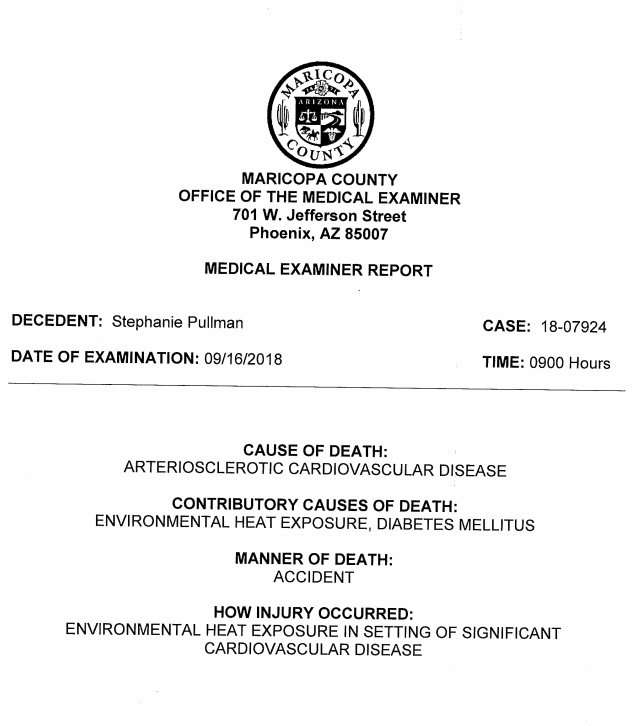New Times published Pullman's story Thursday afternoon. Read it here.
Pullman owed $51 in unpaid bills, her daughter Jeanine Smith told New Times. She shared Pullman's final APS bills, which showed that Pullman paid $125 of the $176.84 APS demanded in
It wasn't enough.
The coroner's report determined that Pullman died of
New Times contacted APS on Tuesday with questions about Pullman's death and the power cutoff.
In a call Wednesday evening with her colleague Jill Hanks, APS spokesperson Jenna Rowell said that Pullman's death "was certainly new information to Jill and me."
They claimed that APS was already reviewing its procedures for power shutoffs, which recently have received considerable media attention, and decided on Wednesday, after hearing of Pullman's death from New Times, that it would temporarily halt all terminations for unpaid bills.
“Learning of [Pullman's] situation factored into our decision to put that into effect," Rowell said.
Rowell said APS would notify residential customers that night, with a media release to go out shortly thereafter.
In its media release, APS said that its decision was driven by several factors, including public comments at open meetings held by the Arizona Corporation Commission, summer heat, and "reports of a 2018 customer death in which heat may have been a contributing factor after electricity service was disconnected."
Around the same time, APS posted a similar crisis-control video on Twitter featuring Chief Customer Service Officer Stacy Derstine.
"You may have heard recent reports in the media of an APS customer who died last year," she said, speaking slowly and carefully. "Those reports indicate that the service was disconnected and the cause of her death may have been heat-related."

The first page of the coroner's report on Stephanie Pullman.
Maricopa County Medical Examiner's Office
Rowell told New Times that APS is required to send a single written notice to a customer before terminating service, but that "we go beyond that." She said APS's standard practice is to send a written notice, call the customer, and put a door hanger at the property.
Smith, Pullman's daughter, said she found a single written shutoff notice after going through her mother's things. She also told New Times that her mother's phone was broken for a period before her death.
She believed that her mother did not know her electricity was about to be cut, or she would have asked her daughters for help. Smith and her sister, Chris Hotes, paid their mother's phone and internet bills, respectively, and sent money for other necessities, like Pullman's water bill.
Asked why Pullman appeared to receive just one written notice, Rowell said, "That’s not our standard practice by any stretch. But in this case, we’re certainly going to look into that in greater detail.”
Smith filed an informal inquiry with the Arizona Corporation Commission after her mother's death. New Times received records from that inquiry from the Commission just as Pullman's original story was being published.
Those records include transactions on Pullman's APS
Over the course of four months, beginning in May, APS said it mailed three shutoff notices to Pullman for delinquent balances, which she paid in part or in full, until she paid the ultimate price.
APS also said it delivered two door hangers to Pullman's house, one on August 2 and another on September 5, the same day that "APS received a partial payment of $125.00 towards Ms. Pullman's account," the records show. "The notice advised of APS's intent to disconnect the service if the delinquent balance was not immediately paid."
On September 7, 2018, "No further payment was received so APS disconnected the service for non-payment," it said.
Seven days later, the sheriff's office found Pullman in her bed. Her body had already begun to decompose.
That day, APS mailed its final bill to Pullman, "in the amount of $287.86," the inquiry to the Corporation Commission showed.
Notes from a call with CorpComm representative Trish Meeter on September 25 showed that Smith told Meeter that she'd scoured her mother's house and had been unable to find a disconnection notice, except for the letter mailed August 20.
According to the records from the CorpComm, APS did not attempt to call Pullman before cutting off her electricity.
Arizona Administrative Code, according to the Commission, bars utilities from cutting off service "where weather will be especially dangerous to health."
Its definition of dangerous weather is comically inappropriate for many parts of Arizona, including Maricopa County: "when the local weather forecast, as predicted by the National Oceanic and Atmospheric Adminstration, indicates that the temperature will not exceed 32 degrees Fahrenheit for the next day’s forecast."
The code also states that "The Commission may determine that other weather conditions are especially dangerous to health as the need arises."
In other words, Arizona's definition of dangerous weather appears to contain nothing about extreme heat.
Holly Ward, a CorpComm spokesperson, said that the Commission's ability to enforce these laws "would likely be determined by an Order to Show Cause" — a type of court order — "and a hearing process."
"The [CorpComm] does not have authority to impose damages," she added.
Last year, APS parent company Pinnacle West raked in profits of $511 million.












